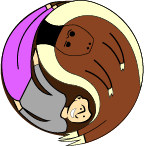The Short of It:
Good deeds are their own reward, not the product of the good deed.

24. Disagreeable Graciousness.
A [person] on tiptoe cannot stand still. A [person] astride cannot walk on.
[Those] who [are self-displaying do] not shine. [Those] who [are] self approving [are] not held in esteem. [Those] who [are] self-praising [have] no merit. [Those] who [are] self-exalting [do] not stand high.
Such persons are in relation to Tau, as the refuse of food or as excrescences on the body to the creature; they are universally loathed. Therefore [those] who [have] Tau will not stay where they are.
24. ‘Painful Graciousness.’
[Those] who [stand] on [their] tiptoes [do] not stand firm; [Those] who [stretch their] legs [do] not walk (easily). (So), [those] who [display themselves do] not shine; [those] who [assert their] own views [are] not distinguished; [those] who [vaunt themselves do] not find [their] merit acknowledged; [those] who [are] self-conceited [have] no superiority allowed to [them]. Such conditions, viewed from the standpoint of the Tao, are like remnants of food, or a tumour on the body, which all dislike. Hence those who pursue (the course) of the Tao do not adopt and allow them.
24. Trouble From Indulgence.
24.1 One on tiptoe is not steady; One astride makes no advance. Self-displayers are not enlightened, Self-asserters lack distinction, Self-approvers have no merit, And self-seekers stunt their lives.
24.2 Before Reason this is like surfeit of food; it is like a wen* on the body with which people are apt to be disgusted.
24.3 Therefore the [person] of reason will not indulge in it.
*Boil or cyst.

The Long of It:
Chapter 24 of the Tao Te Ching warns us about the temptation to let the by-product of the good deed (altruism, or graciousness as Legge and Chalmers call it) replace the good deed itself.
Altruism for the sake of altruism is not altruism at all. It’s the behavior of a sycophant. So if you find yourself expecting good behavior or a reward, you should seriously question your motives for being involved in the first place ([Those] who [display themselves do] not shine. -Legge).
Consider this: whenever we help someone we risk praise, which sets up our expectation for desired behavior. This is dangerous, because we make connections between unmotivated action (on our part) and good behavior (on the part of others). Consequently, when we act but don’t get results, we are left with the scraps of our questionable behavior ([Those] who [are] self-praising [have] no merit. -Chalmers).
On the other hand, when we help someone because we want to, our actions are self-fulfilling and meaningful. We don’t care about the results. We want to do it.
Our desire to help each other is natural. However, we have agency as humans. Be wary of why you are doing things, and bring yourself to the table.
-TB
